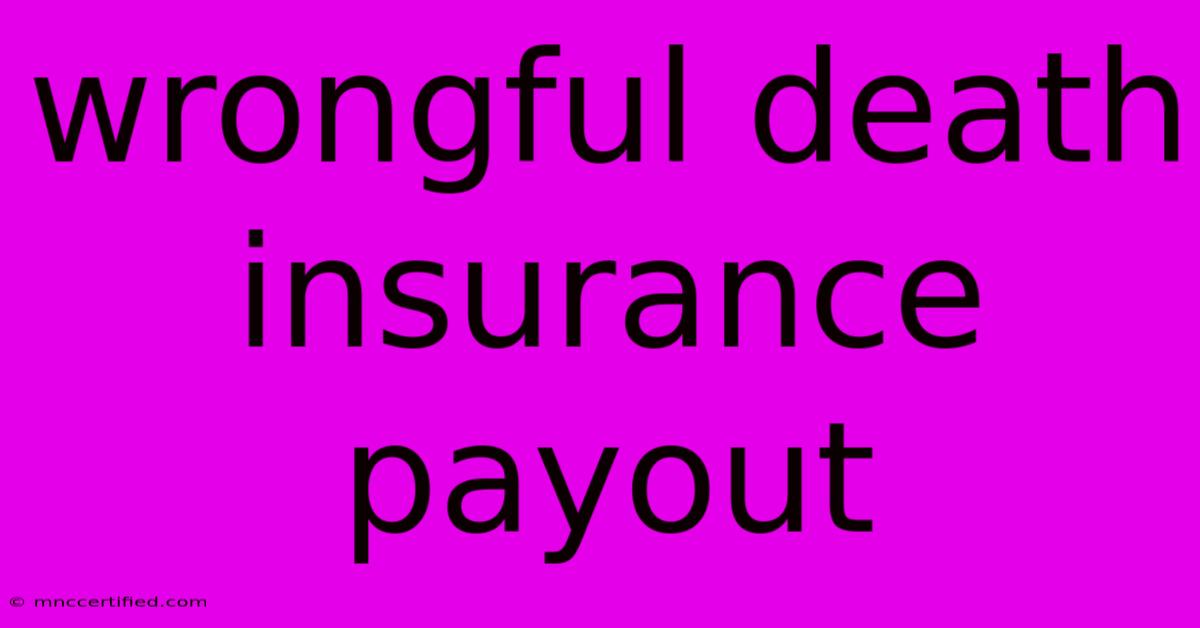Wrongful Death Insurance Payout

Table of Contents
Wrongful Death Insurance Payout: Understanding Your Rights and Options
Losing a loved one is devastating. When that loss is due to someone else's negligence or wrongful act, the emotional pain is compounded by the financial burden. Understanding wrongful death insurance payouts and your rights is crucial during this difficult time. This comprehensive guide explores the complexities of wrongful death claims, insurance coverage, and the process of obtaining a payout.
What is a Wrongful Death Claim?
A wrongful death claim is a lawsuit filed on behalf of the deceased's surviving family members against the individual or entity responsible for their death. This usually involves proving negligence, recklessness, or intentional wrongdoing that directly caused the death. Examples include:
- Car accidents: A drunk driver causing a fatal collision.
- Medical malpractice: A doctor's negligence leading to a patient's death.
- Workplace accidents: Unsafe working conditions resulting in a fatal injury.
- Product liability: A defective product causing a fatal injury.
Successfully proving a wrongful death claim requires demonstrating:
- Duty of care: The responsible party owed a duty of care to the deceased.
- Breach of duty: The responsible party breached that duty.
- Causation: The breach directly caused the death.
- Damages: The surviving family members suffered damages as a result of the death.
Insurance Coverage in Wrongful Death Cases
Several types of insurance policies can cover wrongful death claims. The most common are:
- Liability Insurance: This is the most relevant type of insurance in wrongful death cases. Car insurance, homeowners insurance, and commercial general liability insurance all typically include liability coverage. This coverage protects the insured party against financial responsibility for injuries or death caused by their negligence.
- Umbrella Insurance: Umbrella insurance provides additional liability coverage beyond the limits of your primary insurance policies. It can be crucial in wrongful death cases, which can involve substantial damages.
- Life Insurance: While not directly related to the wrongful death claim itself, life insurance payouts can provide financial support to surviving family members. These benefits are paid out regardless of the cause of death, unless explicitly excluded in the policy.
What Damages Can Be Recovered in a Wrongful Death Claim?
Damages in a wrongful death lawsuit can be significant and are designed to compensate the surviving family for their losses. These can include:
- Medical and funeral expenses: Costs associated with the deceased's final illness and funeral arrangements.
- Lost income: Compensation for the deceased's lost future earnings.
- Loss of companionship and support: This covers the emotional and practical support lost due to the death.
- Pain and suffering: This compensates the surviving family for the emotional distress caused by the death.
The Process of Obtaining a Wrongful Death Insurance Payout
The process of obtaining a wrongful death insurance payout can be complex and lengthy, often involving:
- Investigation and Evidence Gathering: A thorough investigation is crucial to build a strong case. This includes gathering medical records, police reports, witness statements, and other relevant documents.
- Filing a Claim: The claim is filed with the at-fault party's insurance company.
- Negotiations: The insurance company will likely attempt to settle the claim for a lower amount than what the family believes is appropriate.
- Litigation: If negotiations fail, the case may proceed to litigation. This can involve extensive discovery, depositions, and potentially a trial.
- Settlement or Verdict: The case may conclude with a settlement reached between the parties or a verdict after trial.
Seeking Legal Representation
Navigating the complexities of a wrongful death claim requires experienced legal counsel. A wrongful death attorney can:
- Investigate the accident or incident thoroughly.
- Gather and present evidence effectively.
- Negotiate with insurance companies.
- Represent the family's interests in court.
Finding the right attorney is crucial. Look for an attorney with a proven track record of success in wrongful death cases.
Conclusion
Wrongful death insurance payouts can provide crucial financial relief to families grappling with the loss of a loved one. Understanding your rights, the process involved, and the potential damages you can recover is essential. Seeking legal guidance from a qualified wrongful death attorney is highly recommended to protect your interests and ensure you receive the compensation you deserve. Remember, this information is for general knowledge and should not be considered legal advice. Consult with a legal professional for specific guidance on your situation.

Thank you for visiting our website wich cover about Wrongful Death Insurance Payout. We hope the information provided has been useful to you. Feel free to contact us if you have any questions or need further assistance. See you next time and dont miss to bookmark.
Featured Posts
-
Dundee United 1 1 Draw At Rangers Report
Nov 24, 2024
-
Next Rangers Chairman Tory Peer
Nov 24, 2024
-
Iu Football Vs Ohio State Game Grades
Nov 24, 2024
-
U Mass Vs Georgia Score Live Game Updates
Nov 24, 2024
-
I Hate Being An Insurance Agent
Nov 24, 2024